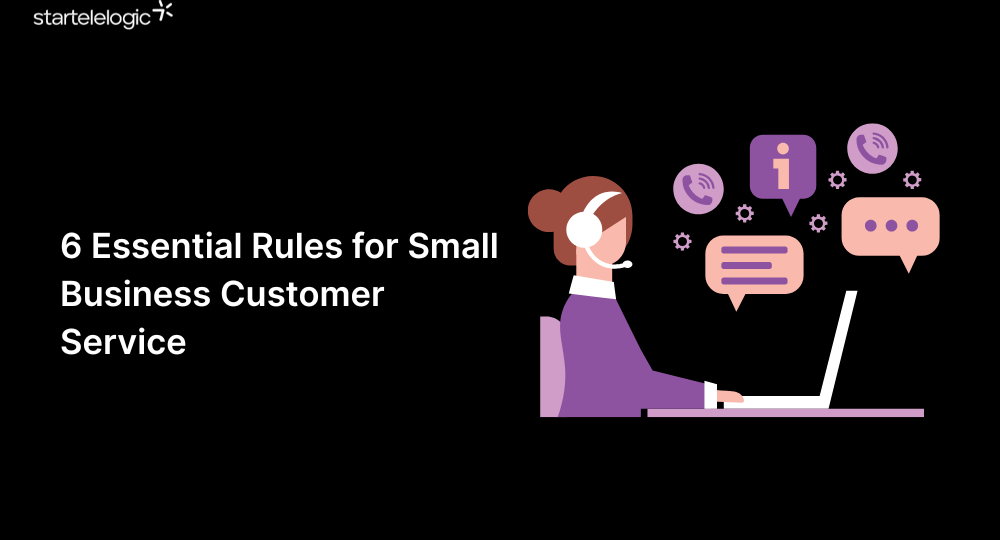In today’s highly competitive market, small businesses must go above and beyond to differentiate themselves from their competitors. One of the most powerful ways to do this is through exceptional customer service. Outstanding customer service not only drives repeat business but also generates positive word-of-mouth referrals, builds brand loyalty, and enhances overall business reputation. In this comprehensive guide, we will explore six essential rules for small business customer service that every entrepreneur should implement. Our primary keyword for this article is small business customer service.
Why Customer Service Matters for Small Businesses
For small businesses, resources are often limited compared to larger corporations. However, one area where small businesses can truly excel is customer service. Unlike big companies, small businesses often have the advantage of building personal, long-term relationships with their customers. Delivering an outstanding experience can be the key factor that keeps customers coming back and recommending your business to others.
Research shows that 89% of customers are more likely to make another purchase after a positive customer service experience. On the flip side, 61% of customers stop doing business with a brand after a single bad experience. These statistics highlight just how crucial customer service is for small businesses looking to grow and thrive.
Rule 1: Always Listen to Your Customers
The foundation of excellent small business customer service lies in listening. Customers want to feel heard and understood. When you take the time to listen, you not only solve their problems but also build trust and show that you value their input.
- Actively listen: Avoid interrupting your customers and acknowledge their concerns before offering solutions.
- Encourage feedback: Use surveys, reviews, or direct conversations to gather insights into customer experiences.
- Implement suggestions: Demonstrating that you act on customer feedback will strengthen loyalty and trust.
Listening helps identify problems early and ensures your business evolves with customer needs.
Rule 2: Be Consistently Responsive
Responsiveness is another cornerstone of effective customer service. In the digital age, customers expect quick and efficient communication across various platforms.
- Respond quickly: Whether through email, social media, or phone calls, customers appreciate timely responses.
- Set clear expectations: If a resolution takes time, let customers know when they can expect an update.
- Offer multiple channels: Provide different ways for customers to reach you – email, phone, chat, or social media – to make communication convenient.
A fast and transparent response can turn a potentially negative experience into a positive one.
Rule 3: Personalize Every Interaction
One of the biggest advantages small businesses have over larger corporations is the ability to personalize service. Personalization shows customers that they are more than just a transaction.
- Remember names: Addressing customers by name creates a sense of connection.
- Tailor recommendations: Use past purchases or preferences to suggest products or services.
- Celebrate milestones: Recognize birthdays, anniversaries, or loyal customer milestones with discounts or special offers.
When customers feel valued, they are far more likely to become repeat buyers and brand advocates.
Rule 4: Train and Empower Your Team
For small business customer service to be truly effective, your employees need proper training and empowerment. Your team represents your brand in every customer interaction, so it is vital to equip them with the right skills.
- Invest in training: Teach employees how to handle complaints, respond to inquiries, and use empathy.
- Empower decision-making: Give staff the authority to solve problems on the spot, without unnecessary delays.
- Foster a positive culture: A motivated and appreciated team will deliver better customer experiences.
When your employees are confident and well-trained, customers will notice the difference.
Rule 5: Go the Extra Mile
Exceptional customer service often comes down to going beyond what is expected. This extra effort leaves a lasting impression and can turn occasional buyers into loyal fans.
- Offer surprise perks: Small gestures like free samples, handwritten thank-you notes, or unexpected discounts can delight customers.
- Resolve issues generously: Instead of sticking rigidly to policies, consider what will truly make the customer happy.
- Exceed expectations: If you promise delivery in five days, aim to deliver in three.
By consistently exceeding expectations, your small business will stand out in customers’ minds.
Rule 6: Follow Up and Stay Connected
Customer service does not end once a transaction is complete. Following up shows that your business cares about the customer’s satisfaction even after the purchase.
- Check in post-purchase: Send a quick message or email to ensure the customer is happy with their product or service.
- Ask for reviews: Encourage satisfied customers to leave positive reviews online.
- Stay connected: Use newsletters, loyalty programs, or social media to keep your brand at the top of customers’ minds.
Consistent follow-up builds stronger relationships and creates long-term loyalty.
Benefits of Excellent Small Business Customer Service
Implementing these six rules can transform how customers perceive and interact with your brand. Some key benefits include:
- Increased customer loyalty: Satisfied customers return more often.
- Positive word-of-mouth: Happy customers share their experiences with friends and family.
- Improved online reputation: Great reviews attract new customers.
- Higher revenue: Loyal customers spend more and purchase more often.
Exceptional small business customer service ultimately drives sustainable business growth and success.
Conclusion
Customer service is not just an afterthought, it is the heart of a successful small business strategy. By listening to your customers, responding quickly, personalizing interactions, training your team, going the extra mile, and following up, you create unforgettable customer experiences. These six essential rules for small business customer service will help you build lasting relationships, generate repeat business, and establish a reputation that sets you apart from competitors.
Remember, in the world of small business, customer service is not just about solving problems, it is about creating meaningful connections that fuel growth and long-term success.
FAQs About Small Business Customer Service
1. Why is small business customer service so important?
Small business customer service is essential because it builds trust, loyalty, and positive word-of-mouth. Unlike large corporations, small businesses rely heavily on repeat customers and referrals, making excellent service a key growth driver.
2. How can small businesses improve their customer service?
Improvement comes from listening to customers, responding quickly, training staff, and personalizing interactions. Implementing the six essential rules of small business customer service can create memorable customer experiences.
3. What are the biggest challenges in small business customer service?
Limited staff, tight budgets, and balancing workload with customer needs are common challenges. However, focusing on empathy, responsiveness, and personalization can help overcome these obstacles.
4. How does technology help in small business customer service?
Tools like live chat, customer relationship management (CRM) software, and social media platforms enable small businesses to respond faster, track customer interactions, and build stronger relationships.
5. What role does employee training play in small business customer service?
Employee training ensures that staff handle inquiries and complaints effectively. Well-trained employees feel empowered and confident, which directly enhances customer satisfaction.
6. How can small business customer service increase revenue?
Excellent customer service leads to repeat purchases, positive online reviews, and referrals. Loyal customers often spend more over time, which helps small businesses boost long-term revenue.



